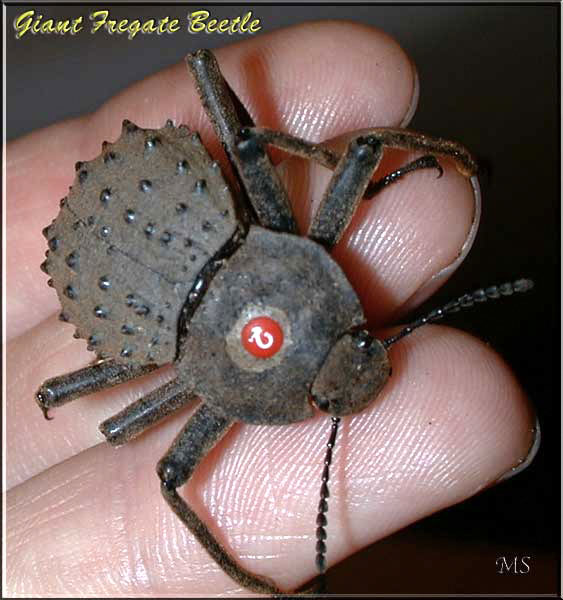 |
| Image from the Zoological Institute of St. Petersburg |
This is the Frigate (or Frégate, depending on your language) Island Tenebrionid Beetle (Polposipus herculeanus), and it is the largest known tenebrionid in the world. For all of you non-coleopterists out there, tenebironids are better known as Darkling Beetles1, and their larvae are far better known as mealworms. In day to day life, mealworms are seen in two situations: you either have a pet insectivore2, or you have flour that has been in your pantry far too long.
Now that we know a little about the family, on to the Frigate Island Beetle itself. Sources give it's length as 20 to 30 mm. That might not seem like much, but look at that picture again. That's not a small beetle. They are completely flightless--probably due to their size--and don't get around much. They spend the entirety of their lives on a few dead trees in a small area. The absolute farthest that they've recorded this beetle traveling is a whopping 19 meters3. The beetle is apparently able to find all its life needs on the few dead trees within those 19 meters. I haven't found what it eats, exactly; I wouldn't be surprised if scientists weren't sure. Looking at its kin, I would guess that the rotting trees are their main food source.
The Frigate Island Beetle has a fun defensive mechanism that I wish I had a visual for. It will, when threatened, exude a purple, stinking, staining chemical. I'm sure the t-shirts of the visiting entomologists look lovely after a day of research.
Frigate Island itself is a tiny island within a larger archipelago called Seychelles, just north of Madagascar. Of course, being from a small, pretty tropical island means that two things are threatening the beetle population: habitat loss and invasive species. A recent program to eradicate the rats (it's always rats) was succesful. Cooler still, the London Zoo has a breeding program, and you can even (figuratively) adopt a Frigate Island Beetle.
By the way, the Coconut Crab is also from Seychelles, and is listed as Data Deficient. It will likely get a post in the near future.
1Not Darkwing, Darkling!
2I, for example, have a tub of 50 in my refrigerator for my Leopard Gecko.
3Even for a beetle, this is small. The American Burying Beetle is not considered a distant traveling beetle, and is about the same size as this one, but can travel two miles on the scent of carrion.

1 comment:
It's probably just the picture, but that beetle sure looks spider-like. Pretty cool!
Post a Comment